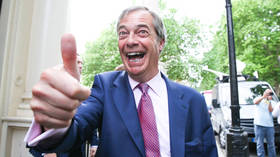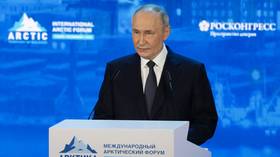EU vote results are the most dramatic upheaval in European politics in 40 years – Ken Livingstone

The results of the European Union election are the most dramatic upheaval in the politics of Europe since the first European Parliament elections 40 years ago.
Across Europe, we have seen a surge of support for the parties of the far-right, but also for the Greens. The moderate conservative and social democrats, who have dominated this parliament for 40 years, have seen their votes slump more dramatically than they feared.
This is clearly going to make for a difficult European parliament with little prospect of cross-party agreements or a consensus emerging about the way to take Europe forward.
But the biggest upheaval was of course in Great Britain. Nigel Farage’s Brexit party came top of the poll with 32 percent of the vote, whilst the Conservatives slipped to fifth place with just nine percent. This is the most stunning decline of any party in my lifetime as it was only two years ago in Britain’s general election that the Tories got 42 percent of the vote. A slump in the vote was almost as bad for the Labour party. At the general election in 2017, they got 40 percent of the vote. This has now slumped to 14. All across the Western world, people have lost trust in the traditional parties that have dominated politics of the post-war world.
Also on rt.com EU election results show people are ‘fed up with fake democracy’But as we pour over the figures, quite significant facts emerge. In Britain 35 percent of voters supported parties that want Britain to leave the EU, 40 percent supported parties like the Liberal Democrats and the Greens, who wish to remain, but Labour and the Tories, who both have plans to leave but with a deal, got only 23 percent of the vote. The collapse of the Labour and Tory votes reflects the growing anger of people who have watched our parliament waffle away and fail to come up with a serious policy that can get a majority in the House of Commons.
It’s three years since the people of Britain narrowly voted to leave the EU and the failure of parliament to honor the pledge that both main parties gave at the general election two years ago that they would leave with a deal is the cause of this biggest upheaval in British politics in over a century. The real problem is that our voters were lied to during the referendum with the Brexiters promising that our economy would dramatically improve if we left the EU, but since then every business organization has warned about the damage to our economy if we leave without a deal or if we leave at all. This is what led Theresa May to spend three years trying to get a trade deal with the EU but what she came up with could not persuade her hard-line leave MPs to go along with that deal because it would have left Britain under some degree of control by the European Union.
Labour went even further arguing that we should remain part of the single market for the obvious reason that if we don’t we could see hundreds of thousands of jobs lost as our exports to the EU plummet. The trouble for Labour is that staying in the single market, whilst it is good for our economy, leaves us completely subject to all the rules and regulations of the EU, but because we are leaving we’ve lost our say in what those rules should be and whether or not they can be changed. The simple fact is if we want to stay as part of the single market we will be better off staying in the EU so we would have a veto over the rules and also have an ability to propose changes and amendments.
Also on rt.com Brexit bludgeon batters Britain’s politics all over again - George GallowaySo where are we now? The resignation of Theresa May has triggered a two-month Tory leadership campaign with possibly over a dozen contenders. But the dramatic collapse of the Tory vote as millions of their supporters switched to Brexit means that most of the leading candidates are talking about being prepared to leave the EU at the end of October without a deal.
The Tory leadership contest has two stages: The 300 Conservative MPs will spend several weeks voting several times until the two leading candidates emerge, then the Tory party members will get to chose which of them will get to become prime minister. But over recent years the Tory party membership has declined to just over a hundred thousand and most of them are committed to a hard Brexit without a deal.
For months Theresa May lost vote after vote in the House of Commons on the Brexit issue but there is a clear majority amongst all MPs for not leaving without a deal. This means we’re very likely to have a prime minister committed to leaving without a deal but unable to get that decision through parliament, which opens up the prospect of what would be the most unpredictable general election ever.
Philip Hammond, Chancellor of the Exchequer, has made it clear he would be prepared to vote to bring down his own Tory government if it was proposing a no-deal Brexit. The Tory party is torn apart now between those who want no-deal and those who recognize the damage that would do to our economy. This row has been ratcheted up by Boris Johnson who is the favored candidate of the Tory party membership.
Boris Johnson is not the only one prepared to go for no-deal. Esther McVey, Dominic Raab, Steve Baker and Jeremy Hunt have all declared they would stand and are trying to win the support of the hard-line Brexiters. But it’s not just Philip Hammond who is prepared to block such as disaster, he is supported by Rory Stewart and Justine Greening with Stewart warning that “a no-deal Brexit would in a single day undermine four hundred years of our reputation for economic stability and confidence.”
Also on rt.com Anti-establishment parties scored big in EU elections since bloc became ‘problem & not solution’Given the vast majority of Labour MPs will vote against a no-deal Brexit, there is no chance of this getting through parliament and so the next prime minister will have little choice but to call a general election.
Recent opinion polls show that in a general election Labour could win 29 percent of the vote, with Brexit second at 24 percent, the Conservatives in third place with just 22 percent and the LibDems with 11. This would almost certainly mean a parliament without one party having a majority but with the possibility of a Conservative/Brexit coalition. This would be a disaster for Britain and also damage the EU, so those who wish to stay in the EU need to come together in a joint campaign to prevent what would be the biggest disaster for our economy since the great depression of the 1930s. In the Euro elections, there was some talk about a deal between the LibDems, the Greens and the other regional parties that oppose Brexit, but it never came about.
The crucial player in determining our future is the Labour party. It needs to form a coalition with the LibDems and the Greens but this means Labour having to accept that staying in the customs union whilst leaving is not a good deal and it’s better to tell people the truth that for Britain to walk away from the largest economy in the world will be a disaster. I also think the prospect of a coalition government based on Labour, the Greens and the LibDems could be the best government Britain has seen since the post-war Labour government of Clement Attlee.
Think your friends would be interested? Share this story!
The statements, views and opinions expressed in this column are solely those of the author and do not necessarily represent those of RT.















